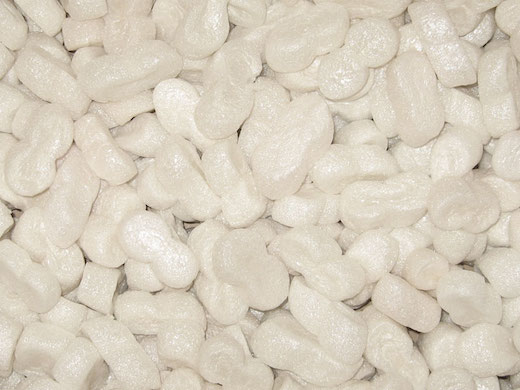
Building better and more sustainable batteries is certainly one of the goals for the future. And now, those packing peanuts used to protect fragile things from breaking during transport could play a major role in achieving this goal. A team of researchers at Perdue University has discovered that these packing peanuts could actually be used in lithium-ion batteries.
The way this would be achieved would be by replacing the graphite anodes in a lithium battery by a new type of anode made of carbon. In currently used batteries, the charging process stores the lithium ions in graphite anodes. But the researchers at Purdue scientists now used the packing peanuts to replace this with a carbon anode.
The first step in the process was heating the packing peanuts (that are either starch-based or made from polystyrene) to a temperature of between 932 to 1,652 ºF (500 and 900 ºC). This heating process was performed in an inert atmosphere, in the presence or absence of a transition metal salt catalyst. Depending on whether the peanuts were starch based or made from polystyrene, this process yielded either carbon nanoparticles or carbon microsheets, which both make superb anodes.
This is due to the fact that anodes produced by this process are only about one tenth as thick as the graphite ones. This allows for quicker charging times. Also, according to the researchers, these new anodes also showed less electrical resistance than graphite, or more accurately, they exhibited a maximum specific capacity of 420 mAh/g (milliamp hours per gram), while the theoretical maximum for graphite anodes is 372 mAh/g. Also, the carbon anodes withstood 300 charging cycles without a significant loss in this capacity.
The microsheets produced via the heating process were especially effective, due to their porous structure, which allowed for more contact area between the anode and the battery’s ion-carrying liquid electrolyte. The next step in the research is to make these even more porous, so as to further enhance their electrochemical performance.
So in short, recycling packing peanuts in this way is a very sustainable solution, and basically kills two birds with one stone. What’s more, the packing peanut conversion process is inexpensive, environmentally-friendly, and would lend itself well to large-scale battery production.
Related Articles on JetsonGreen.com:
Car Tires Recycled into More Efficient Anodes for Batteries
Biodegradable Sugar Powered Batteries Soon Available?
Scientists Combine Solar Cell and Battery into a Single Highly Efficient Package

Leave a Reply
You must be logged in to post a comment.